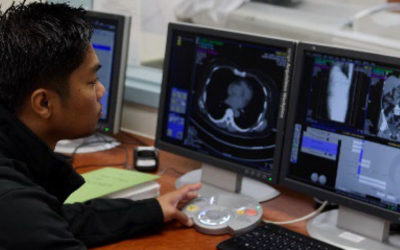Congress recessed for August without passing legislation to close the nearly $15 billion budget shortfall VA is facing for this year and next. The shortfall, which came to light in July, includes $2.88 billion for the remainder of FY2024 and $12 billion for FY2025.
New Algorithm Developed for Urinary Retention Evaluation, Catheterization
A new algorithm could improve care for adult inpatients who need to be evaluated for urinary retention and possible catheterization, according to a recent study.
Does ‘Underserved’ Designation Demoralize Staff at VA Facilities?
For the past several years, VA has been identifying the most underserved facilities in its system and requiring them to create action plans to improve care to their veterans.
VA EHR Rollout at Lovell Federal Healthcare Center Better Than Previous Sites, But Legislators Say Some Issues Persist
About six months ago, the James A. Lovell Federal Healthcare Center became the sixth VA site to switch to the Oracle-Cerner electronic health record (EHR).
Study: Propofol Use Should Be Minimized in Children With ALL
A study involving military researchers has raised concerns about the use of certain types of anesthesia in children with acute lymphocytic leukemia (ALL)
Removing Race From Lung-Function Equations Shifts Disease Classifications
In 2023, the American Thoracic Society recommended race-neutral interpretation of lung function and requested the investigation of “consequences for the yet-unquantified number of individuals with results near decision-making thresholds.”
Essien Pushes Pharmacoequity in VA Healthcare to Combat Disparities
A general internist and health services researcher with the Center for the Study of Healthcare Innovation, Implementation, and Policy (CSHIIP) at the Greater Los Angeles Healthcare System, Utibe Essien, MD, MPH, has devoted his career to defining and then breaking down the systemic problems that lead to healthcare inequity.
VHA Closely Follows Clinical Guidelines on Gender-Affirming Hormone Therapy
When initiating gender-affirming hormone therapy (GAHT) at the VHA, clinicians achieved high overall concordance between current GAHT initiation practices and guidelines, particularly for feminizing GAHT, according to a recent study.
OIG: VISN Leaders Had No Awareness of Toxic Work Environment, Cardiac Surgery Delays at the Rocky Mountain Regional VAMC
At the Rocky Mountain Regional VAMC, a toxic work environment caused by a handful of facility leaders resulted in mass resignations by top clinical staff and the closure of its cardiothoracic surgery program, according to a report from the VA Office of the Inspector General (OIG).
VA Renews Oracle Contract Amid Intense Criticism of EHR Rollout
VA has renewed its contract with Oracle Health to support its electronic health record modernization project. The 11-month extension will place emphasis on not only improving the much-beleaguered EHR, but on holding Oracle accountable when goals are not met.
Novel Psychotherapy Targeting Unresolved Trauma Reduces Chronic Pain in Older Adults Better Than Traditional CBT
Chronic pain in older adults can be significantly reduced using a newly developed psychotherapy called emotional awareness and expression therapy (EAET), which confronts past trauma and stress-related emotions that can exacerbate pain symptoms, according to a new study.
Shared Decision-Making Tool Promotes More Effective Use of Lung Cancer Screening
Research, including a new study of 57,000 U.S. veterans diagnosed with lung cancer, has shown that low-dose computed tomography lung cancer screening (LCS) saves lives.
Tracking Genetic Risk to Better Understand Which Veterans Have Alzheimer’s
Because of overlapping symptom profiles observed in cognitive disorders, psychiatric disorders, and environmental exposures such as head injury, clinicians can find it difficult to detect early signs of Alzheimer’s disease and related dementias (ADRD).
Pathogenic Variants Found in More Nonbladder Urinary Tract Cancer Patients
In an effort to evaluate factors that could affect the likelihood of identifying a clinically actionable germline pathogenic variant (PV), a new study investigated a real-world multicenter cohort of patients with urinary tract cancer (UTC).
Novel Genetic Associations Identified in So-Called Macular Pucker
Symptoms of epiretinal member (MRM), sometimes called macular pucker, can be severe and require surgery. Patients often complain of loss of central vision and/or visual distortion (i.e. metamorphopsia or “wavy vision”).
VA Projects $2.88 Billion Shortfall for This Fiscal Year; $12 Billion for Next Year
VA is projecting a $2.88 billion budget shortfall for the remainder of fiscal year 2024 and another $12 billion for FY2025. This comes after VA leaders spent this spring assuring Congress that its FY2025 budget request, while lean, would be sufficient to do the job.
Atrial Fibrillation Patients Less Likely to Receive Anticoagulant Therapy at VAMCs Serving More Minority Patients
VA patients receive different medical care for atrial fibrillation depending on whether they visit a VAMC serving more minority patients, according to a new study.
Closing in on More Than a Half Century of Cancer Breakthroughs, VA Continues Pioneering Work in Oncology
The VA has been at the forefront of cancer research in the United States. Starting with the establishment of its first tumor research laboratory in 1932 and groundbreaking work in the 1950s on the association between smoking and respiratory tract cancers, the agency has repeatedly changed the course of oncology.
Highlights of the VA’s Contributions to Cancer Research
In the more than 90 years since the VA established its first tumor research laboratory at the Hines, Ill., VA hospital, the agency has published some of the most instrumental studies in cancer in the U.S.
Is VA Avoiding Reporting Requirements in Supply Chain Modernization?
Lawmakers on both sides of the aisle are upset at VA for delays in providing Congress with information about its ongoing Supply Chain Modernization (SCM) project.
Congress member Calls for McDonough Resignation Over Questionable Bonuses
VA Secretary Reminds Committee He Sought Investigation WASHINGTON, DC—A member of the House VA Committee has called on VA Secretary Denis McDonough to resign over the nearly $11 million in bonuses inappropriately paid to senior VA Central Office (VACO) officials....
Huge Financial Impact From Lapses in, Misuse of VA Prime Vendor Program
A recent audit of VA’s Medical Surgical Prime Vendor Program (MSPV) found that lack of oversight of the system, which is meant to save VA money by better leveraging the department’s buying power, is costing VA hundreds of millions a year.
Recurrent Hyperkalemia Found to Be Higher in Black, Hispanic Veterans
In U.S. veterans with incident hyperkalemia, the risk of recurrent hyperkalemia within one year is higher in Black and Hispanic patients, according to a recent study.
Supplements Marketed to Military Contain Dangerous, Illegal Substances
Dietary supplements for weight loss are widely promoted online and through social media, with many claiming to have the added benefits of building lean muscle and enhancing energy and performance.
Fewer Deaths After Serious Illness in Veterans Treated With PARC Care Model
After a serious illness, veterans who received medical care via the Post-Acute Recovery Center (PARC) model experienced fewer deaths and more days outside of the hospital compared to those not treated with PARC, according to a recent study.
Prospective Memory Deficits Explained in Multiple Sclerosis Patients
Patients with multiple sclerosis (MS) have been found to have prospective memory (PM) deficits. A new study sought to better understand how and why that occurs.
Veterans With MS Face Disparities in VA Smoking-Cessation Treatment
Even though smoking is a risk factor for multiple sclerosis (MS) development, symptom burden, decreased medication efficacy and increased disease-related mortality, veterans with the disease continue to smoke at critically high rates, according to a new study.
Why Does Epstein-Barr Lead to Multiple Sclerosis in Some Patients?
Only a small proportion of patients infected with the Epstein-Barr virus (EBV) develop multiple sclerosis (MS). A new military study sought to determine why that is and what the underlying mechanisms are.
In a Turnaround, Nearly All VA Hospitals Require Personnel to Get Flu Shots
In 2017, almost no healthcare personnel at VA hospitals reported in a survey that they had received mandatory influenza vaccinations. By 2021, almost all VA respondents said they had.
Processing of ICE Medical Claims by VA Sparks Controversy in Congress
The U.S. House of Representatives has approved an amendment to H.R. 8580, the Military Construction and Veterans Affairs, and Related Agencies Appropriations Act to prohibit the VA from processing claims for the Immigration and Customs Enforcement (ICE) Health Service Corps at the Department of Homeland Security.








